
Paul Laurence Dunbar Chambers Jr. was an American jazz double bassist. A fixture of rhythm sections during the 1950s and 1960s, he has become one of the most widely-known jazz bassists of the hard bop era. He was also known for his bowed solos. Chambers recorded about a dozen albums as a leader or co-leader, and over 100 more as a sideman, especially as the anchor of trumpeter Miles Davis's "first great quintet" (1955–63) and with pianist Wynton Kelly (1963–68).
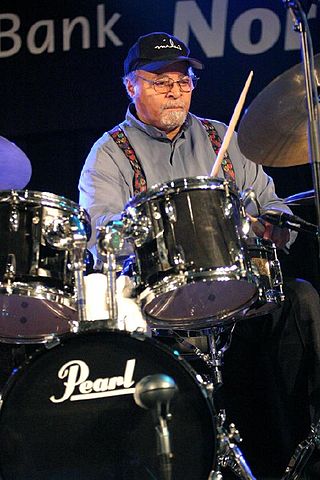
Wilbur James "Jimmy" Cobb was an American jazz drummer. He was part of Miles Davis's First Great Sextet. At the time of his death, he had been the Sextet's last surviving member for nearly thirty years. He was awarded an NEA Jazz Masters Fellowship in 2009.
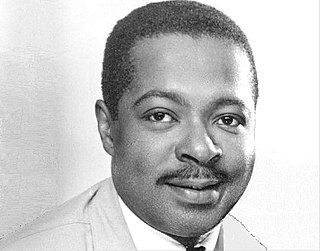
Wynton Charles Kelly was an American jazz pianist and composer. He is known for his lively, blues-based playing and as one of the finest accompanists in jazz. He began playing professionally at the age of 12 and was pianist on a No. 1 R&B hit at the age of 16. His recording debut as a leader occurred three years later, around the time he started to become better known as an accompanist to singer Dinah Washington, and as a member of trumpeter Dizzy Gillespie's band. This progress was interrupted by two years in the United States Army, after which Kelly worked again with Washington and Gillespie, and played with other leaders. Over the next few years, these included instrumentalists Cannonball Adderley, John Coltrane, Hank Mobley, Wes Montgomery, and Sonny Rollins, and vocalists Betty Carter, Billie Holiday, and Abbey Lincoln.
"Freddie Freeloader" is a composition by Miles Davis and is the second track on his 1959 album Kind of Blue. The piece takes the form of a twelve-bar blues in B♭, but the chord over the final two bars of each chorus is an A♭7, not the traditional B♭7 followed by either F7 for a turnaround or some variation of B♭7 for an ending.

Roll Call is an album by jazz tenor saxophonist Hank Mobley. It features trumpeter Freddie Hubbard, pianist Wynton Kelly, bassist Paul Chambers, and drummer Art Blakey.
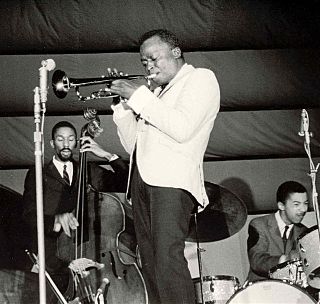
The Miles Davis Quintet was an American jazz band from 1955 to early 1969 led by Miles Davis. The quintet underwent frequent personnel changes toward its metamorphosis into a different ensemble in 1969. Most references pertain to two distinct and relatively stable bands: the First Great Quintet from 1955 to 1959, and the Second Great Quintet from late 1964 to early 1969, Davis being the only constant throughout.

Introducing Wayne Shorter is the debut album by jazz saxophonist Wayne Shorter. It was recorded on November 9 and 10, 1959, at Bell Sound Studios in New York City. It features five Shorter compositions, plus Kurt Weill's "Mack the Knife”, performed by a quintet featuring trumpeter Lee Morgan, pianist Wynton Kelly, bassist Paul Chambers and drummer Jimmy Cobb. Shorter played with Morgan in the front line of Art Blakey's Jazz Messengers at this time while Kelly, Chambers and Cobb were the widely celebrated rhythm section with Miles Davis.

Here's Lee Morgan is an album by jazz trumpeter Lee Morgan originally released on the Vee-Jay label. It was recorded on February 8, 1960, and features performances by Morgan with Clifford Jordan, Wynton Kelly, Paul Chambers and Art Blakey.

Presenting Cannonball is the 1955 debut album by jazz saxophonist Cannonball Adderley, released on the Savoy label, featuring a quintet with Nat Adderley, Hank Jones, Paul Chambers, and Kenny Clarke. A 1994 Japanese CD release also included alternate takes of tracks from Adderley's recording debut previously released as Kenny Clarke's Bohemia After Dark (1955).
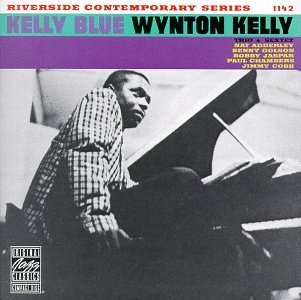
Kelly Blue is an album by American jazz pianist Wynton Kelly, released in 1959.
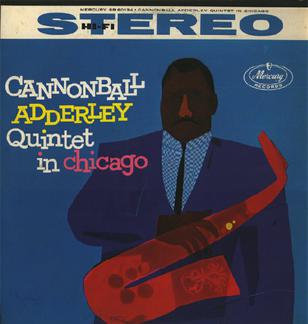
Cannonball Adderley Quintet in Chicago is an album by jazz saxophonist Cannonball Adderley, his final release on the Mercury label, featuring performances by Adderley with John Coltrane, Wynton Kelly, Paul Chambers and Jimmy Cobb.

Cannonball Takes Charge is an album by jazz saxophonist Cannonball Adderley released on the Riverside label featuring performances by Adderley with Wynton Kelly, Paul Chambers, and Jimmy Cobb with Percy and Albert Heath replacing Chambers and Cobb on two selections.

Plus is an album by Cannonball Adderley Quintet released on the Riverside label featuring performances by Adderley with Nat Adderley, Wynton Kelly, Victor Feldman, Sam Jones and Louis Hayes.

Someday My Prince Will Come is an album by jazz pianist Wynton Kelly featuring performances by Kelly with Paul Chambers or Sam Jones and Jimmy Cobb recorded in 1961 and one track with Lee Morgan and Wayne Shorter from 1959 released by the Vee-Jay label in 1961. Additional performances from these sessions were released as Wynton Kelly!.

Super Hits is a greatest hits album from Miles Davis. Released in 2001, it reached #22 on Billboard's Jazz Albums chart.

Basic Miles: The Classic Performances of Miles Davis is a compilation album by American jazz musician Miles Davis, released in 1973 by Columbia Records and recorded from 1955 through 1962.

1st Bassman is an album by jazz bassist Paul Chambers, recorded at Bell Sound Studios on May 12, 1960 and released by the Vee-Jay label. This album is notable for its featured use of the acoustic bass as the lead instrument. Chambers is supported by trumpeter Tommy Turrentine, trombonist Curtis Fuller, tenor saxophonist Yusef Lateef, pianist Wynton Kelly and drummer Lex Humphries.
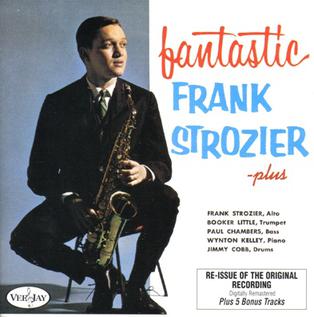
Fantastic Frank Strozier is the debut album by American saxophonist Frank Strozier, recorded in 1959 and 1960 for Vee-Jay Records. The personnel includes the rhythm section from part of Miles Davis's Kind of Blue, recorded earlier in 1959.

The Young Lions is an album by an ad hoc group of jazz musicians: Wayne Shorter, Frank Strozier, Lee Morgan, Bobby Timmons, Bob Cranshaw, Albert Heath and Louis Hayes. It was recorded at Bell Sound Studios in New York City in 1960 and released in 1961 on Vee-Jay Records.
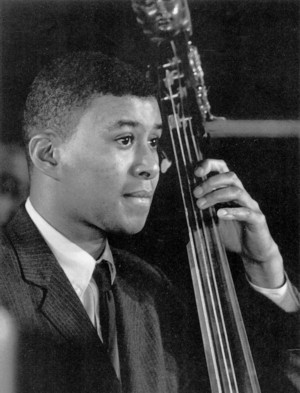
The Paul Chambers discography describes the works of American jazz bassist Paul Chambers, which he recorded from 1955-1969..



















